
Revolutionizing energy with Mersen fuses, capacitors, cooling and bus bars for inverters
In the dynamic field of energy conversion and power electronics, high-quality fuses for inverters play a crucial role, as well as capacitors, bus bars and cooling devices.
Mersen's focus on safety and efficiency helps navigate the complexities of modern power systems, reflecting their commitment to advancing the industry with practical, reliable solutions.
-
Mersen in a few figures
We are present worldwide to share our expertise in electrical conversion and power electronics with you.-
220.00 °C
thermal resistance for coolings for SiC semiconductors
-
33.00 countries
Mersen's presence
-
130.00 years
Expertise in power electronics
-
1.00 ww rank
in passive components for power electronics
-
-
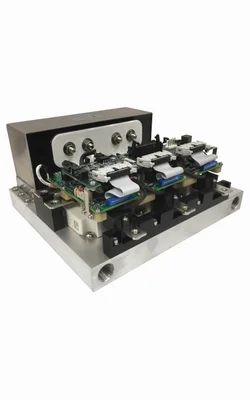
Energy conversion
Elevating energy conversion through fast-acting fuses for inverters
In the realm of energy conversion, the significance of fast-acting fuses, particularly those designed for inverters, cannot be overstated. These fuses, including fast-acting fuses, are integral in addressing the myriad challenges faced in efficiently converting and managing electrical energy. They serve as critical safeguards, protecting sensitive components from the potential damages caused by overcurrent and electrical surges. This protection is vital in systems where precision and reliability are paramount, such as in renewable energy applications and advanced power electronics.
Moreover, the integration of cooling solutions for inverters complements the function of these fuses. These cooling systems ensure that the inverters and associated components operate within safe temperature ranges, thereby enhancing overall system stability and longevity. The synergy between fast-acting fuses, capacitors, bus bars and effective cooling solutions epitomizes the advanced approach required in modern energy conversion technologies, ensuring both safety and efficiency in these critical systems.
-
Ensuring reliability and performance in all applications
Working with Mersen for our electronic systems has been a pivotal experience for us.
Their products bring unmatched safety and efficiency to our energy conversion systems.
Mersen’s expertise in fuse technology has been a game-changer for us, ensuring reliability and performance in our demanding applications.”

Johan Richard
Technical Director
-
Energy conversion
What is a fast-acting fuse?
A fast-acting fuse is a protective device designed to safeguard electrical circuits from overcurrents and short circuits. It operates by interrupting the flow of current when it surges to unsafe levels, reacting quickly to prevent damage to power electronics. These fuses are essential in applications where rapid response is critical to protect sensitive components and maintain system integrity.
-
Mersen range of fast-acting fuses for power electronics
-
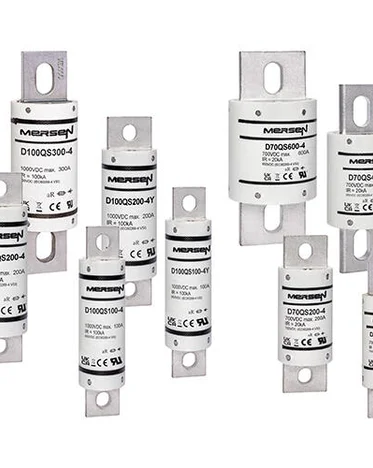
Fast-acting fuses
for high-performance environments
Mersen's fast-acting fuses are meticulously engineered to provide immediate response to overcurrents, thereby protecting sensitive electronic components. Fast-acting fuses are an essential safeguard in power electronics, where rapid current interruption can mean the difference between a minor incident and catastrophic system failure. They are especially critical in high-performance environments where precision and quick reaction times are non-negotiable.
-
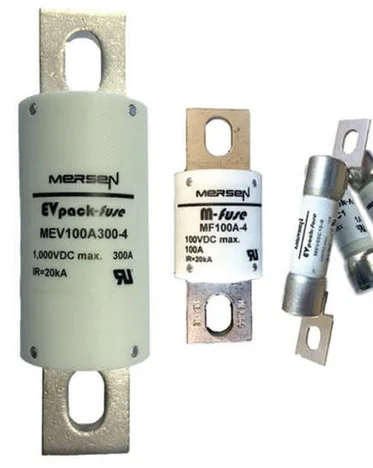
DC fuses
to secure DC power management
Mersen's DC fuses are crafted to address the unique protection requirements of direct current systems. DC fuses are vital in applications ranging from solar panels to battery storage systems, where they prevent damage due to overcurrents and ensure the longevity of the energy conversion process. With a focus on durability and performance, Mersen's DC fuses are a cornerstone of secure DC power management.
-
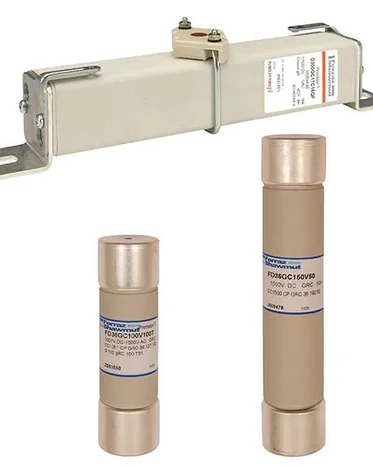
Fuses for power
electronics
The fuses for power electronics in Mersen's lineup are designed to protect a broad spectrum of devices and systems that control and convert electrical power. Fuses for power electronics are integral to the safeguarding of components that manage everything from minute electronic signals to large-scale power outputs. Mersen's fuses for power electronics are synonymous with reliability, ensuring that the systems they protect are both safe and functional.
-
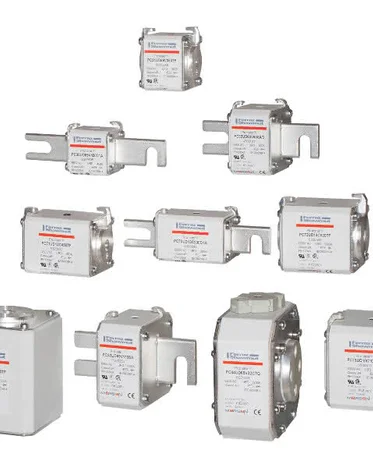
High speed fuses
or semiconductor protection fuses
High-speed fuses from Mersen are the go-to choice for protecting against overcurrents in circuits that operate with high energy levels. High speed fuses are designed to react in microseconds, providing protection for power semiconductors and other components that are critical to the operation of modern power electronic systems.
-
-
How to choose your fuses for inverters?
Selecting the right fuses for inverters is a critical decision that impacts the safety, efficiency, and longevity of power electronics systems. The choice of fuses for inverters must take into account the specific characteristics of the inverters.
Ensuring quick response: the need for high-speed fuses
High-speed fuses are essential for protecting inverters from sudden overcurrents. When choosing a fuse, it's important to consider the time-current characteristics to ensure the fuse will respond quickly enough to protect the inverter without causing unnecessary downtime due to nuisance tripping.
Safeguarding direct current systems: why DC fuses matter
DC fuses are a critical component in the protection of direct current systems. When selecting a DC fuse, it's important to consider the specific needs of your system, including the voltage rating and the interrupting capacity.
Achieving reliable power conversion with the right fuses for power electronics
The right fuses for power electronics are key to achieving reliable power conversion. When choosing fuses, consider the specific requirements of your power electronics system, including the operating current and the voltage rating, to ensure comprehensive protection.
-
What is a bus bar?
A bus bar is an integral electrical component that streamlines power distribution by efficiently transferring electrical power within various setups such as panels, boards, and substations. Constructed from highly conductive materials like copper, aluminum, or brass, bus bars are engineered to handle substantial current flow. Their core purpose lies in centralizing the electrical power at one juncture to distribute it to different outlets, thereby simplifying the electrical circuitry's architecture and enhancing overall system safety and efficiency.
Mersen's bus bars stand out in the market for their superior quality and durability. Designed with precision, they offer a reliable solution for various applications, ensuring minimal power loss and maximizing the electrical system's performance. Whether for industrial, commercial, or renewable energy applications, Mersen's bus bars provide a robust foundation for efficient power distribution.
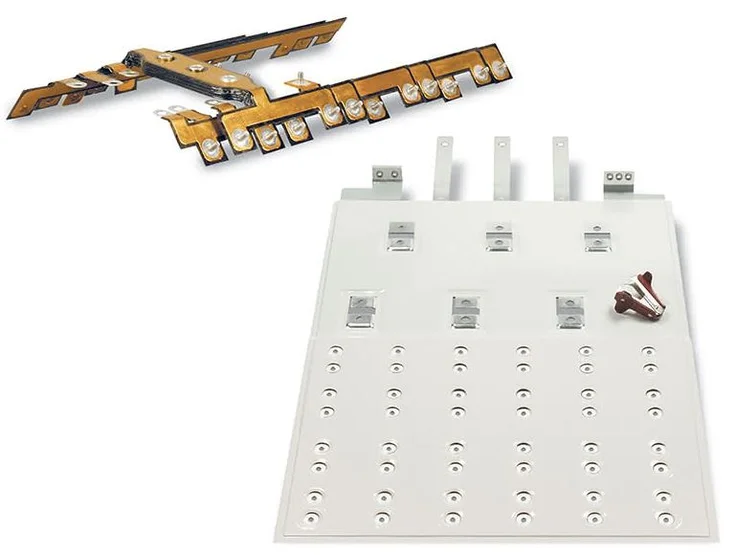
-
What is a capacitor?
A capacitor is a versatile electrical component crucial for storing and managing energy within a circuit. It is composed of two conductive plates separated by a non-conductive material or dielectric, which stores energy in the form of an electric field when voltage is applied. This ability makes capacitors indispensable for applications such as voltage regulation, filtering, and energy storage across both AC and DC circuits.
Mersen's capacitors are engineered to meet the highest standards of reliability and performance. Specializing in advanced capacitors for energy storage and power management solutions, Mersen's products are pivotal in optimizing the efficiency and stability of electrical and electronic systems. From smoothing voltage fluctuations to supporting transient surges and enhancing power quality, Mersen's capacitors are key to advancing technology in power electronics, renewable energy, and beyond, ensuring that your systems operate at peak efficiency.
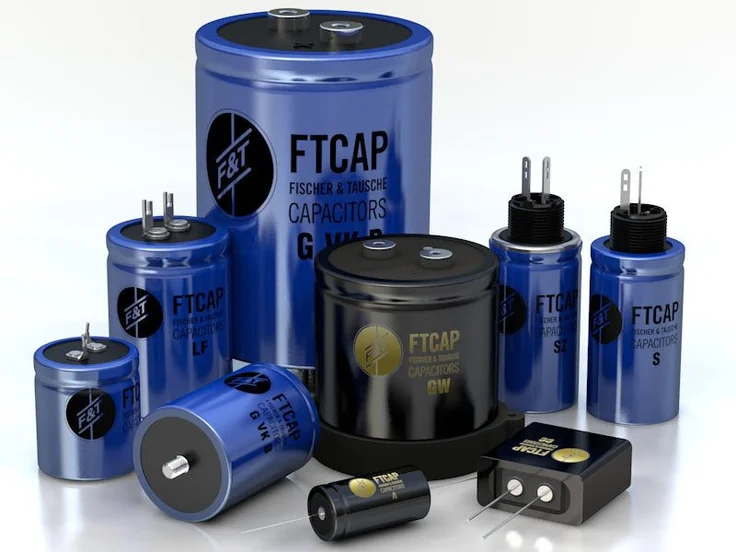
-
Air heat sink vs liquid cold plate : what’s the difference?
-
How do air heat sinks work ?
Air heat sinks, leveraging the ambient air as a cooling medium, are widely used for their simplicity and cost-effectiveness.
They dissipate heat through natural convection or forced air systems, making them suitable for a variety of applications where moderate cooling is sufficient.
-
How do liquid cold plates work?
Liquid cold plates offer a more direct and efficient method of cooling, using a liquid coolant to transfer heat away from sensitive components. This approach is particularly effective in high-power or high-density applications where air cooling is insufficient.
Liquid cold plates can achieve lower temperatures and more precise temperature control, but they come with increased complexity and cost.
-
How to choose between air heat sink and liquid cold plate?
Choosing the right cooling solution—between air heat sinks and liquid cold plates—crucially influences the efficiency, reliability, and performance of power electronics systems. This decision hinges on several factors, each reflecting the unique demands of the application.
- Cooling capacity and efficiency: If the system generates a high amount of heat or operates in a high-temperature environment, liquid cold plates are often more effective. Their superior cooling capacity and efficiency are ideal for tightly packed or high-power components. Air heat sinks might suffice for applications with lower thermal loads or where ambient air can effectively dissipate the heat.
- Space and weight constraints: Air heat sinks, while simpler, can be bulkier and heavier due to the need for large surface areas for effective heat dissipation. In contrast, liquid cold plates offer a more compact and potentially lighter solution, crucial in space-constrained environments such as aerospace or automotive applications.
- Precision and control: Liquid cooling systems provide greater precision and control over system temperatures, which is vital for applications requiring stringent temperature management. This level of control is harder to achieve with air cooling, especially in variable ambient conditions.
- Cost and complexity: Air heat sinks typically have lower upfront costs and simpler designs, making them attractive for applications where simplicity is valued. Liquid cold plates, though potentially offering superior performance, come with higher initial costs and complexity, including the need for pumps, reservoirs, and maintenance to prevent leaks or corrosion.
-
Which cooling solutions for inverters should you choose?
Choosing the right cooling solutions for inverters is crucial for maintaining system efficiency and preventing overheating. Mersen offers a range of cooling solutions tailored to the specific needs of power electronics, ensuring that your inverter operates at optimal temperatures.
Addressing high-temperature challenges of SiC power modules
Cooling for SiC is essential to address the high-temperature challenges presented by silicon carbide components. Mersen's cooling solutions for silicon carbide are designed to handle the high thermal conductivity of SiC, ensuring that these components are kept at safe operating temperatures.
Maximizing inverter lifespan with efficient cooling solutions
The longevity of inverters is significantly enhanced by efficient cooling solutions. Mersen's cooling solutions for inverters are engineered to manage the heat generated during operation, which is crucial for maintaining performance and preventing thermal-related failures. When choosing a cooling solution for inverters, consider the thermal design power and the ambient operating conditions to ensure optimal heat dissipation.
Optimizing heat management: the importance of heat sinks for power electronics
Heat sinks are an essential cooling solution component in power electronics for managing excessive heat. When choosing a heat sink for power electronics, consider the material, size, and design to ensure it aligns with the thermal requirements of your system.
Enhancing durability: why cooling for silicon carbide module is essential
The durability of silicon carbide components is greatly enhanced by effective cooling. Mersen's cooling solutions for silicon carbide are specifically engineered to manage the heat generated by SiC components, which is vital for preserving their longevity and performance in power electronics applications.
Prolonging IGBT lifespan through effective cooling
Effective cooling is essential for prolonging the lifespan of IGBTs (Insulated Gate Bipolar Transistors). Mersen's cooling solutions for IGBTs are designed to manage the heat generated by these high-efficiency switches, ensuring that they operate within their thermal limits for a longer service life.
-
-
On which markets are high-speed fuses used?
Fast-acting fuses are indispensable in multiple sectors, offering essential protection against electrical hazards.
Fast-acting fuses for power electronics
In power electronics, particularly in devices like inverters and converters, fast-acting fuses play a vital role in safeguarding against sudden electrical surges. These components are responsible for converting and regulating power within various electronic devices. Fast-acting fuses ensure that any abnormal current spike is quickly managed, preventing damage to sensitive electronic components.
Fast-acting fuses for renewable energy
In the renewable energy sector, especially in solar panels and wind turbines, fast-acting fuses are critical. They protect against overcurrents that can occur due to fluctuating energy levels caused by changing weather conditions. These fuses ensure the stability and efficiency of power conversion systems, which are vital for converting wind and solar energy into usable electricity.
Electric vehicles fuses
EV fuses protect the intricate battery systems from potential electrical overloads and short circuits. This protection is crucial, considering the high power demands and the sensitivity of the battery systems in electric vehicles. EV fuses help in maintaining the integrity and longevity of the electrical vehicle's power system.
Fast-acting fuses for data centers
Data centers, which are the backbone of the digital world, rely on fast-acting fuses to protect their power infrastructure. Fast-acting fuses are essential in preventing power disruptions that could lead to data loss or damage to expensive server equipment. They ensure a stable and reliable power supply, which is critical for the continuous operation of data centers.
Fast-acting fuses for industrial automation
In industrial automation, including machinery and robotics, fast-acting fuses are crucial for the protection of complex electrical systems. These systems often involve high-speed operations and precise control, where any electrical fault could result in significant downtime or damage.
-
Enhancing inverter performance with cooling solutions, fuses, capacitors and bus bars for inverters
Optimizing inverter performance involves a multifaceted approach that includes the implementation of effective cooling solutions, the selection of appropriate fuses, and the strategic use of bus bars and capacitors. Bus bars play a crucial role in distributing power efficiently within the inverter, minimizing losses and improving overall efficiency. Capacitors, on the other hand, are essential for smoothing out voltage fluctuations and ensuring a stable power output. Together with cooling solutions that prevent overheating and fuses that protect against overcurrents, these components are integral to maximizing the reliability, efficiency, and lifespan of inverters.
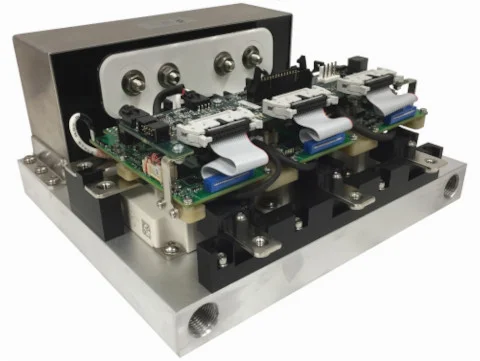
Cooling for inverters plays a significant role in reducing thermal stress on components, thereby extending their operational lifespan. This is particularly important in high-performance environments where inverters are subject to continuous use.
The addition of bus bars helps in efficient power distribution, further alleviating stress on the system. Similarly, capacitors aid in voltage regulation, contributing to the stability of the inverter under varying loads. Fast-acting fuses further enhance this benefit by protecting the inverter from potential electrical faults, ensuring a prolonged operational lifespan by preventing damage to crucial components.
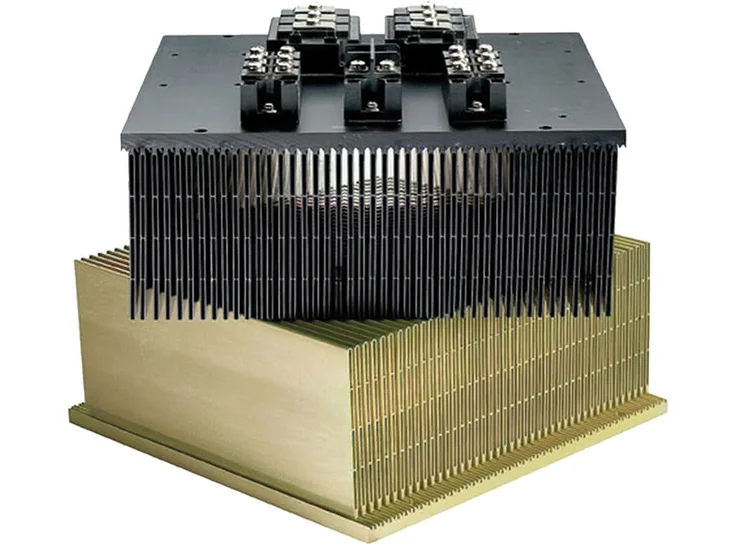
Effective cooling directly impacts the efficiency of inverters by preventing overheating, which can degrade performance. Bus bars contribute to this efficiency by ensuring minimal power loss across the system, while capacitors play a critical role in maintaining energy consistency and smoothing out voltage spikes.
Together, these components ensure that inverters operate within an optimal temperature range, crucial for the smooth functioning of inverters. Fast-acting fuses complement these cooling solutions by providing rapid response to overcurrent situations, preventing scenarios that could lead to overheating and reduced efficiency.

-
What are the benefits of Mersen fast-acting fuses?
Mersen's fast-acting fuses provide critical protection in power electronics, offering rapid response to overcurrents, enhancing safety, and minimizing equipment damage.
Rapid response: immediate protection against overcurrent
Mersen's fast-acting fuses are engineered for swift intervention during overcurrent events, crucial for protecting sensitive power electronics. Their ability to respond instantaneously to abnormal current flow prevents potential damage to components such as inverters, converters, and power modules, ensuring uninterrupted operation.
-
Why choose Mersen for your fast-acting fuses?
-
01.
Decades of experience in electrical protection position them as a leader in components for power electronics

-
01.
Rigorous testing to ensure reliability and safety in power electronics applications

-
01.
Fuses tailored for various power electronics needs

-
01.
Expert guidance and after-sales service ensuring optimal performance and safety

-
-
Energy conversion
Need to get information on fuses or cooling solutions for inverters?